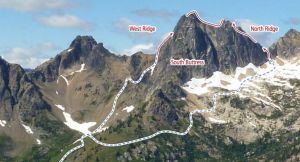North Ridge, Cutthroat Peak III 5.7 |
||
Washington Pass, Washington, USA | ||
| ||
|
Avg time to climb route: 2.5-4 hours
Approach time: 2-6 hours Descent time: 2-6 hours Number of pitches: 13 Height of route: 600' Overview
The North Ridge of Cutthroat is a little known but historic route with just a few unsavory sections that keep it from becoming a classic. Save for the first three pitches, the whole route is on stellar, mostly clean granite. If approaching from the Washington Pass side, Pitch 1 is on horrendous rock making this route better for climbers willing to run it out on loose 4th and low 5th class terrain with a well- protected section of 5.7-. Approaching from Rainy Pass is less common but avoids this first unpleasant pitch but has two or three shorter pitches of slightly loose climbing up a ramp to gain the same notch. From either approach, climbers willing to deal with the first loose section will be rewarded by fine, moderate climbing on a fantastically exposed ridge on good rock. The views of the surrounding area are awesome and the climb over the final gendarme and up the final ridge is quite memorable.
Photos
- View all 2 photos of North Ridge as: Thumbnails | Slideshow
Climber Beta on North Ridge
Find other routes like
North Ridge
Route History
Fred Beckey, Jim Crooks and Ed Kennedy first climbed the North Ridge on August 19, 1940. Not much is known about the ascent. The same year Fred Beckey and Jim Crooks, along with Fredís brother Helmy Beckey and David Lind, made the first ascent of Forbidden Peak via its West Ridge.Route Strategy
This route is not crowded and youíll likely have it to yourself, even on a busy weekend. After the first few pitches, the route is extremely moderate with sustained low 5th class climbing on solid, clean granite. Once you have gained the ridge proper, the rock is excellent, but gaining the ridge, especially from the Washington Pass side, requires dealing with some horrible rock. If approaching from the Washington Pass side (southeast), there is one long 140- foot pitch that is by far the worst pitch of the route. It starts with around 70 feet of 4th class with virtually no solid protection. Then in the middle of the pitch you get to the crux of the route, about 10 feet of 5.7 climbing. Luckily, right before committing to this section, you get two bomber cams. After the crux section, there is more runout, loose, 4th class to the col. Have the belayer stand off to the side so the leader can throw down loose holds.You can avoid the first and nastiest pitch by approaching from the Rainy Pass side. This is a longer and less traveled approach, but is better because you to get to the col without having to climb the nasty loose pitch on the east side of the ridge. Instead you ascend 2-3 short pitches up 4th and low fifth class rock that is a little dirty and loose but way more solid than the rock on the other side of the mountain. Regardless of which way you get there, once gaining the small col in the ridge, Pitch 2 starts right off the ground with some unobvious 5.6 climbing on slightly dirty rock. This section protects okay with solid nut placements. One more far easier pitch on easier and increasingly clean and solid granite gains the crest. Passing on any of these three pitches is difficult and you donít want to climb below another party. Once atop Pitch 3, there are many options and passing another group is easy at any point. From here, the climbing is enjoyable and never harder than 5.4 on solid, mostly clean granite. Before descending down the gendarme at the top of Pitch 10, take a moment to scope out the coming pitches. The route finding isnít too devious, but there is only one good way to go. While the volume of 5.6 and 5.7 climbing is small, the North Ridge is long, and climbers should be solid at the grade. The 5.7- is well-protected but there are some big run outs on low 5th class ground. Carry your gear gear up and over the route. Whether you approached from Rainy Pass or Washington Pass, it is a long way back over to the Col or the base of the North Ridge from the base of the West Ridge. It is clear on the opposite side of the mountain, over nearly half a mile on scree, talus and boulders. Retreat Storm
Retreat is difficult because of the routes long traversing nature. There are no fixed anchors and few trees to rappel off. From high on the route, you could consider rappelling straight down the North Face and descending back down Porcupine creek or traversing around the West Ridge col and back down to the Washington Pass side.
Everything You Need to Know About
Washington Pass
Search the internet for beta on
North Ridge
|
Other Routes on Cutthroat Peak
|





